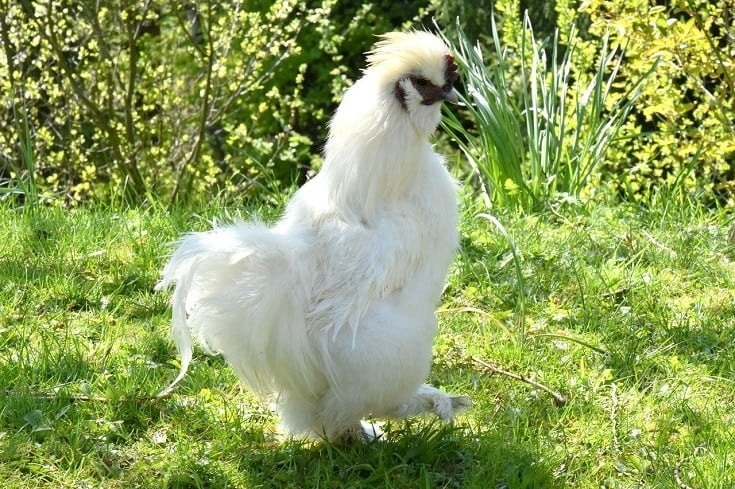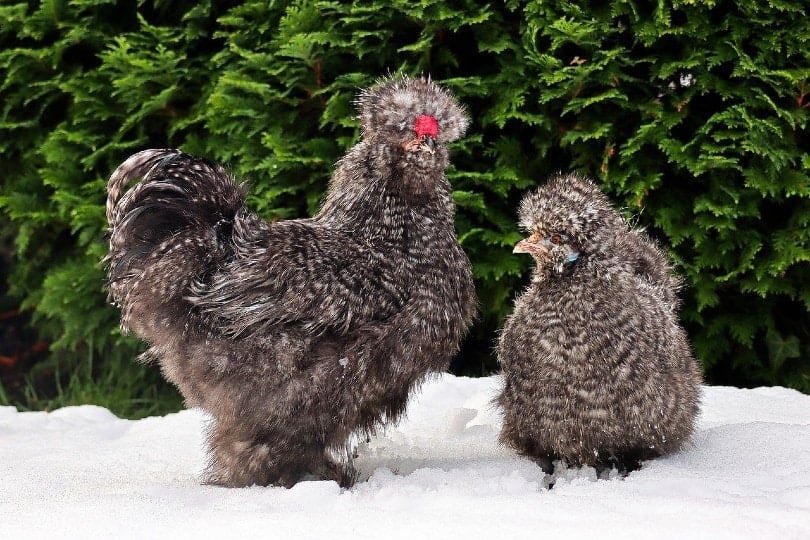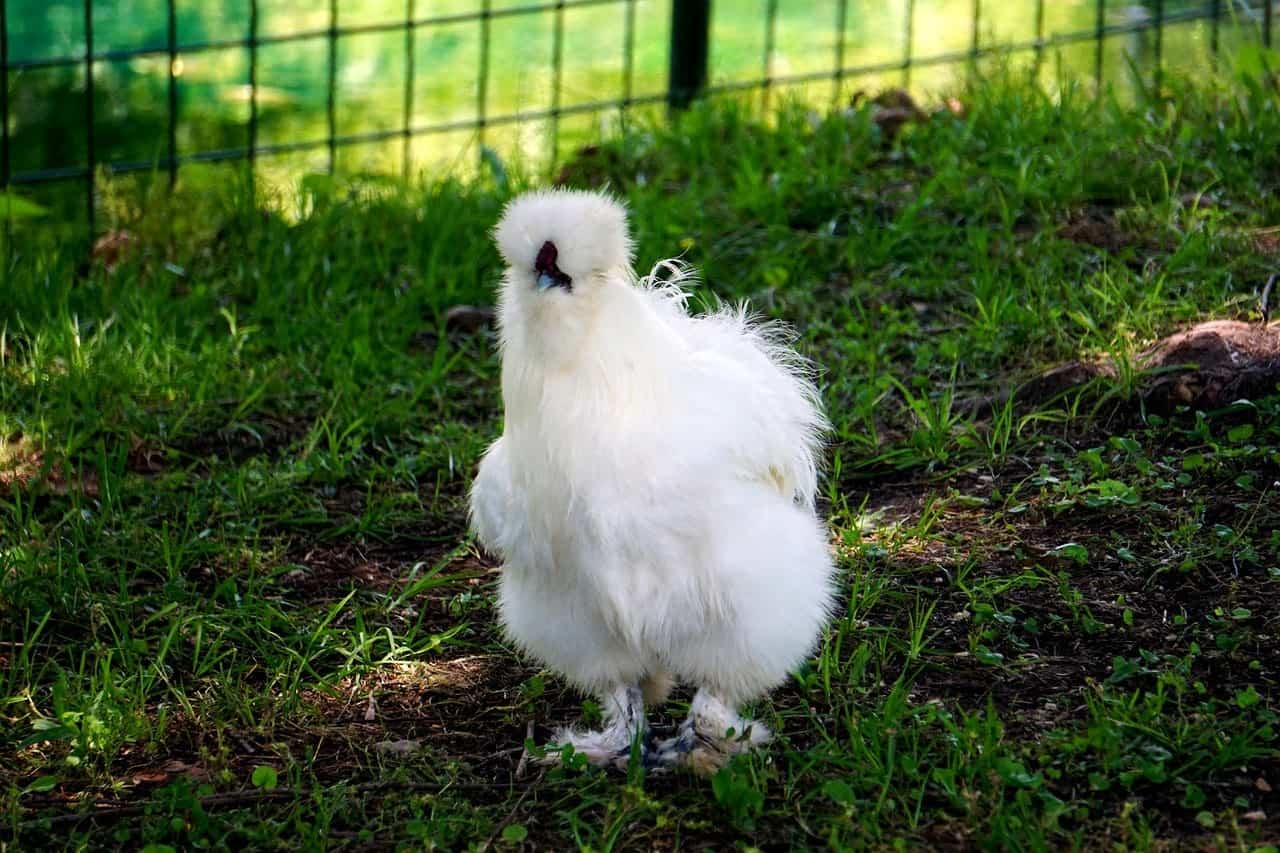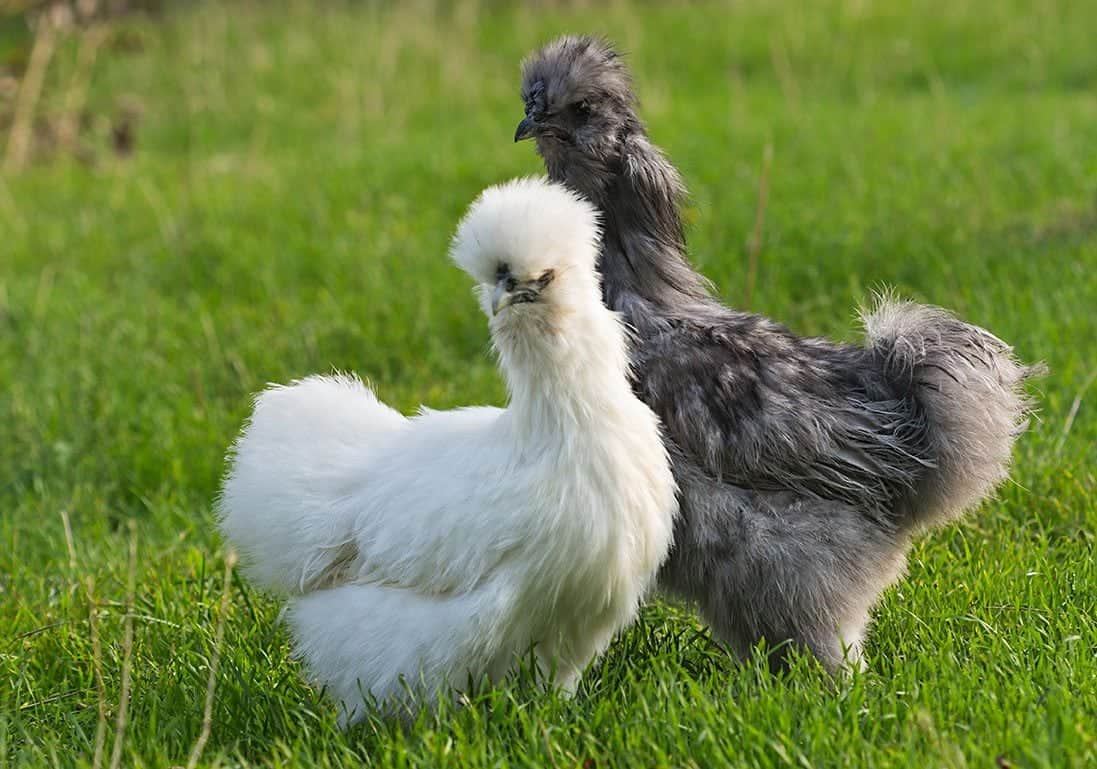There are more than 100 chicken breeds in existence today, and they all have something special to offer. Some chickens make great pets for kids and adults alike, while others lay plenty of eggs to help save money at the grocery store. Still, others are raised for meat.
What about the silkie chicken? This chicken breed is special in more ways than one. Their feathering, personality, and characteristics are like those of no other chicken breed out there. Want to learn more about this cute, cuddly chicken breed? Read on!

Quick Facts About Silkie Chickens
| Species Name: | Gallus domesticus |
| Family: | Phasianidae |
| Care Level: | Low |
| Temperature: | Moderate |
| Temperament: | Friendly, gentle, talkative, intelligent |
| Color Form: | Black, blue, gold, red, gray, buff, partridge |
| Lifespan: | 7–9 years |
| Size: | 8–14 inches tall, 2–3 pounds |
| Diet: | Grains, scratch, veggie scraps |
| Minimum Coop Size: | 3 square feet |
| Minimum Run Size: | 6 square feet |
| Compatibility: | Great with farm animals |
Silkie Chicken Overview

Silkie chickens have long, shaggy feathers that make them look super furry. Their slightly comical look belies a fun-loving yet gentle personality that is intriguing to most children and adults. These are Asian chickens that made their way to the United States sometime in the 1200s or 1300s.
These chickens are easy to care for, but they do not do well in cold and damp climates. They cannot fly as other chicken breeds can, and they enjoy living indoors with their human family members. That said, most live outside in coops connected to exercise runs.
These are not big chickens, so they are not the best option when it comes to raising them for meat. They only lay up to 150 eggs a year, so they can merely help reduce your yearly grocery bill unless you have a big flock. The eggs are small, light brown, and tasty.

How Much Do Silkie Chickens Cost?
Silkie chicks can be purchased for anywhere from $3 to $10 each, while adult hens or roosters can be bought for between $15 and $50 each. The pricing depends on many different factors, most importantly, the lineage and quality of the breeder. Other factors that could come into play include the type of food being given to the chickens and the conditions of their habitats.
Typical Behavior & Temperament
These chickens are full of fun yet they are never overly reactive. Their laidback attitude and goofy personality make for comical interactions with them. These sweet birds love the company of humans and will sit on a person’s lap all day long if allowed to. They like to talk, and they enjoy eating right out of people’s hands.
Hens love nothing more than to rear chicks, so they are typically found laying on an egg or two, even if those eggs have not been fertilized. Silkie chickens tend to be docile around other, hardier chicken breeds, which could result in squabbles and injuries. They like to free-range and hunt for bugs and worms, but they cannot protect themselves from predators, so their space should be fenced in or enclosed somehow.
Appearance & Varieties

One of the most impressive things about the silkie chicken is their thick, extremely fluffy feathers that make them look like small, round furballs. Their feathers cover their heads, and sometimes hide their eyes, although they seem to see just fine through those thick feathers.
Their feet and sometimes their legs are also covered in feathers. These chickens come in a variety of colors, including black, white, gray, buff, and blue. They do not grow combs like most other types of chickens do. They have long beaks and small wings, giving them an adolescent look even as adults.

How to Take Care of Silkie Chickens
The good news is that silkie chickens are not only easy but also a joy to care for. They do not need much space to thrive, and they run away any time a human goes toward them. They do not eat much, and they are fun to spend time with. Here is what you should know about their coop setup, eating habits, and healthcare needs.
Habitat Conditions & Setup
Silkie chickens should live in an enclosed area for their protection. If you want to keep a close eye on your chickens, house them in a coop attached to a run for exercise. Each chicken should have at least 3 square feet of available living space in the coop and at least 6 square feet of exercise space in the connected run.
If your chickens will free-range, their open space should be enclosed with chicken wire fencing so dogs and other potential predators cannot get to them. They cannot fly like other chickens, so extra protection is essential. Their habitat needs nothing more than grass, food, and water.

What to Feed Your Silkie Chickens
Like most other chickens, silkie chickens will eat a variety of grains, including cracked wheat, corn, barley, and oats. These grains can be found in commercial scratch or sourced separately and mixed to create a complete meal.
These chickens should be offered about ½ cup of scratch each day, a little less if they are free-range because they will score worms and bugs on their own to round out their diet. Their scratch should be scattered in their living area so they can use their natural foraging instincts and keep their minds sharp. These chickens appreciate being offered vegetable and fruit scraps as snacks throughout the week too.

Keeping Your Silkie Chickens Healthy
Silkies have thick, furry feathers. When the feathers get wet, they weigh the birds down and can take hours to dry. If conditions remain wet, these chickens will have a hard time staying dry at all, which could lead to illness and low quality of life. Therefore, they should live in a space that stays dry and mud-free.
These chickens should be dewormed every few months, as they are susceptible to worm infestation due to their lifestyle of pecking the ground. They do not need any special grooming unless they get wet, in which they should be dried off with a clean towel or rag.
Do Silkie Chickens Get Along With Other Pets?
Silkies are farm animals, and as such, they can typically live with other animals, including ducks, pigs, cows, and horses. However, they may not get along well with other chicken breeds and might find themselves bullied or even injured. Friendly dogs and cats can be introduced to them if the atmosphere is calm and safe, but they should always be supervised while spending time together.

Are Silkie Chickens Suitable for You?
If you are looking for a small chicken that is suitable for beginners and chicken aficionados alike, the silkie chicken is perfect. If you are currently raising other types of chickens, you should not consider introducing these chickens to your setup unless they will have a separate, safe place to live. Are you considering buying one or more silkie chickens? Let us know about your plans in the comments section!
- Next on your reading list: Do Silkie Roosters Crow? What You Need To Know!
Featured Image By: Olga Salt, Shutterstock
